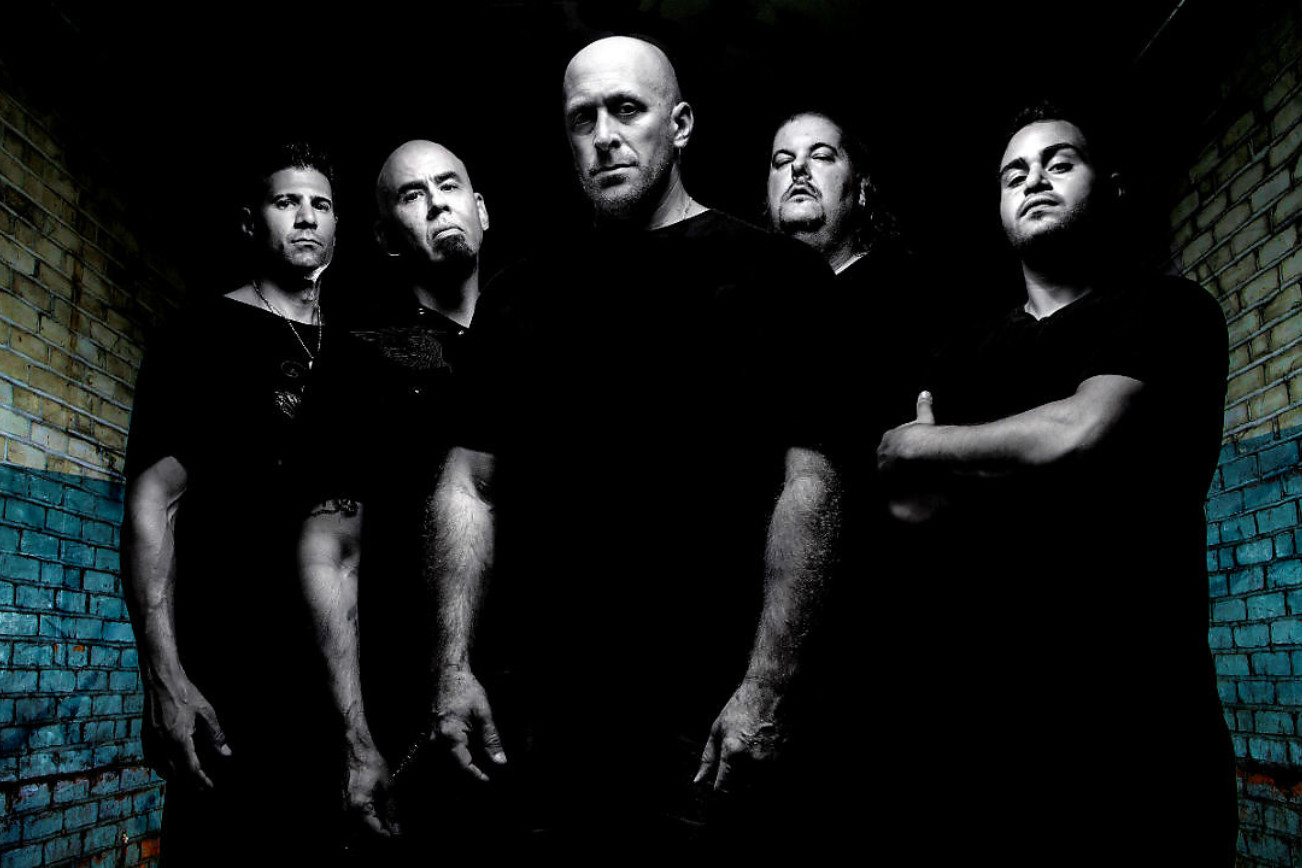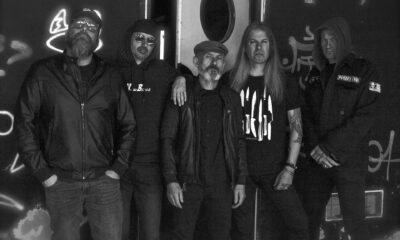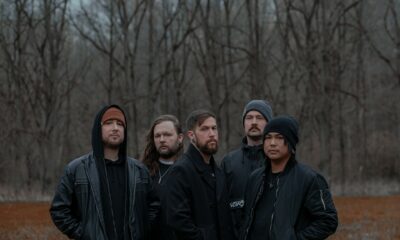Interviews
INDESTRUCTIBLE NOISE COMMAND Guitarist ERIK BARATH Discusses ‘Terrible Things,’ the Band’s Origins, and DIMEBAG DARRELL
Connecticut’s Indestructible Noise Command have released three albums since their reformation nine years ago, including this year’s Terrible Things. We spoke to guitarist Erik Barath a lot about the old days of the late ‘80s, the band’s origins, and various other key moments in the influential metal band’s career.

Connecticut’s Indestructible Noise Command released two of the most unheralded albums of thrash metal’s original wave. Their 1987 debut, Razorback was a rough ‘n’ ready offering of east-coast grit stirred up by progressive sequences and the sound of a young band filled with fiery energy, technique, and discovery. When they returned a year later with The Visitor, it was like they dropped an atom bomb into the heart of convention. The album is undoubtedly a thrash metal record, but every rein was cast aside and all caution thrown to the wind to deliver a gloriously unique display of aggression and irreverence in which you could hear the Bridgeport-based quartet having the time of their lives as they offered up unsung and idiosyncratic classics like “Dry Heave,” “What Are You Looking At?,” “Hypodermic Coastline” and “Scammed Again” as lead guitarist Erik Barath demonstrated himself to be one of the genre’s peculiarly uncommon six-string heroes.
The band split in 1990 but reconvened in 2010 with three original members and have since issued three albums, the latest being Terrible Things which is an encouraging return to form. Terrible Things is out now and self-released by the band (purchase the album now via Apple Music). We never got the chance to speak to I.N.C. during the group’s heyday and now that they’re back on the warpath, we took the opportunity to track down Barath which was complicated by the fact he now lives in Cyprus while the rest of the band is in the Connecticut and New York area. “Because we took so much time off, much of the old guard is gone and the newer magazines and websites are like, ‘Who? I.N.C.? Don’t know who they are,’ he laughs. “It’s almost like we’re a new band and we’re having to reintroduce ourselves to everyone, including the people who missed us the first time around.”
Is it true that the band formed in response to or because of disgust with MTV?
Erik Barath: No, no! The MTV thing came after I built a website called www.antimtv.com which was pretty popular back when MTV started going really pop and the reality shows started to outweigh the video airplay. That was 18-19 years ago. (Bassist/vocalist) Dennis (Gergely) and I have been friends since the sixth grade. We were just best friends who were fucking around on acoustic guitars. I had a tablature book for AC/DC’s Highway To Hell so I’d play it and he’d sing and we decided to form a band. Once we got into high school, we got electric instruments, did cover tunes and around 1985 was when we became I.N.C. and started writing originals and playing shows. MTV was still kind of cool when we formed; we were trying to get on there but by the time we were together, we missed the whole cool wave.
Let’s hear something new from Terrible Things. Check out the recently released music video for “Fist Go Rek:”
What was your intro to the heavier side of things?
Barath: I listened to all the boilerplate stuff like Priest, Maiden and Sabbath, but what broke me open to the darker side, if you will, was Venom’s Black Metal. That album changed me. Those guys were pure evil and I went to a catholic school and fucking hated nuns and when that album came out, it was what I needed! Right after that came Mercyful Fate’s Nuns Have No Fun EP and (Metallica’s) Kill ‘Em All. For me, it was a great time to be into metal; I still loved Priest and all that, but in the early ‘80s it was changing so quickly and I liked the aggressive, darker side.
How did I.N.C. form?
Barath: Back then it was about our close friends and who we hung out with. Like I said, Dennis and I met in school and we were just bored. We didn’t have the internet or PlayStations or any of that stuff. We used to go play basketball then go play guitar. We lived in a pretty bad area of Bridgeport and playing in a band was a way to not commit crime, really. I met (Guitarist) Anthony (Fabrizi) in high school and he joined up. For drummers, we went through a bunch of dudes. We asked some friends who asked some friends and they had some other friends and we found Gary (Dugay), our original drummer.
So, it was social media, but you actually had to be social and talk to people! But no matter what era it is, it’s hard to find musicians who are dedicated. We were lucky then and with the guys we have now, Dave Campo on bass and our drummer Kyle (Shepard) who’s the young guy and brings the average age of the band down like six years, we were lucky as well.
Indestructible Noise Command’s latest record Terrible Things, was released on March 8th, 2019, through the band’s own label:

What was your musical background like and how did it contribute to I.N.C.’s place as thrash scene outliers?
Barath: Well, my parents bought me my first acoustic guitar when I was ten and forced me to take lessons and I had the meanest bitch of a teacher. She was teaching me show tunes, like the theme to Love Story and shit and it’s like, “Dude, really?” I want to play AC/DC and Ted Nugent. After eight months I just bailed, so I don’t know any theory at all. I just know what sounds good and it’s all muscle memory. Anthony knows theory and would always ask me how I put things together and tell me my leads weren’t supposed to make sense, but they worked. It’s just me doing me and coming out the way it does. These days, I mostly write in my head and don’t even need the guitar. The first song on the new record, “Fist-Go-Rek” I wrote in an airport during a layover. It just came to me and it wasn’t until a couple of weeks later that I actually put it all together on guitar.
Was Razorback really recorded while you were all still in high school?
Barath: It was actually half and half. We had our originals and started playing gigs while we were in high school. That was when we were opening up for Exodus, Megadeth and other bands that came through the area. We recorded our demo which had “I.N.C.,” “Fists From The Mighty,” “War Not Words” and another. Those four songs were the demo. We got picked up by Giant Records right after we graduated and the budget they gave us to record wasn’t great, something like 2,500 dollars. It’s hard to make an album for that much now, let alone back then in the era of two-inch tape. It was much more expensive. So, we remixed what we did on the demo and did the new songs on top of it.
We think you’ll quite enjoy this animated and extremely funny new music video for “Identifier” also off of Terrible Things:
It seemed there was a quick rise in notoriety, if not popularity, once Razorback was released. Was the second album song, “Scammed Again,” about the perils of the music industry, part of that rise?
Barath: “Scammed Again” was about a booking agent who ripped us off whose last name was Cox. Some people thought we were being funny and calling him a dick in a roundabout way, even though he was a dick, but his last name actually was Cox. Most of our songs were based on some sort of reality. “Dry Heave” was us drinking too much one night, to the point where we were puking up air and we just wrote about it. We were young and kind of crazy and wrote about whatever we saw and did. As far as the reaction is concerned, it was weird because back then there was no social media so we had no idea who and how many people were buying our records or where we were popular. There wasn’t even SoundScan back then.
Nowadays, we post something online and everyone following us sees it instantly and you get that response. I’ve been getting messages and emails about how we have a lot of fans in Chile, Asia, and Russia. That kind of freaks me out that it’s taken until now to find out that where we had/have a following outside of Connecticut, New York and New Jersey where we always rocked it and had packed crowds. Unfortunately, we were never really able to tour and because of that, we were a little bit clueless about who knew us.
The Visitor was a substantial jump in progression; way more adventurous, quirkier, musically irreverently and overtly humorous. What caused that leap?
Barath: With each record, you keep finding your voice. You start at point A with your influences when you’re 17-18 years old and the second album we more musically mature and refined and we were able to be more precise with our riffs and experiment. I’ve always been the type to never write the same album twice, to push things and keep the listener off-balance.
Indestructible Noise Command’s debut full-length, Razorback, came out in 1987 via Giant Records:

What was the reaction to The Visitor like, especially considering it was at a time of overly serious thrash bands doing ballads and chasing Metallica’s success?
Barath: The funny thing was that The Visitor was actually quite commercially successful. We reached #1 on CMJ hard rock radio charts in America and in the UK it reached #2 as an import. So, there was some weird shit happening, but we never really thought about writing a ballad or being more commercial or anything. We always just did what we wanted to do. Sometimes when you do that, people can appreciate the originality and other time people just don’t get it. We were lucky that enough people got it.
One of the highlights of my musical life at the time was when we played with Pantera. This was before they were signed and were touring for Power Metal. We were hanging out with Dimebag Darrell and he was like, “You guys are one of the reasons we do heavy music now because I love The Visitor.” I wish I had that on tape! (laughs) I remember when they sound checked with “Cowboys From Hell,” which at the time was a new song and direction, and it was amazing. I knew they were going to be huge.
What caused your original split in 1990?
Barath: Because of the success of The Visitor, our manager had basically secured a deal with Epic Records. The paperwork was being finalized when the A&R guy was fired and all his bands got let go, including the bands he was working with and about to sign. It was a year of trying to find a label, four or five months of negotiations and it all fell through. It was heartbreaking. We were ready to record a new album and so much time had passed that we were playing shows with fewer and fewer people coming out. We got frustrated with having to start from scratch and we started fighting with each other. After a while, it wasn’t fun anymore and we just called it quits.
Off of their previous album Black Hearse Serenade, watch I.N.C.’s music video for “Love Like Napalm:”
What had you been up to since reforming in 2010?
Barath: We all did different things. I was in a rock band for a while that was a sort of a Lenny Kravitz-ish, psychedelic, classic rock thing. I did a little bit of industrial metal. Anthony was the smart one; he played in a cover band and was making good money at it. It was probably the only time any of us made any money playing music. (laughs) Dennis went into hardcore with his band Payback and everyone’s got family, work, kids and life. There was always talk of getting back together and doing a couple shows but I was like, “If we’re going to come back, we’re actually going to do something.” I started writing songs in late 2009 and that what spurred us to reunite and make music again.
Now that you have reformed with a third album and you have a logistical plan to deal with you being in Cyprus and your drummer recently moving to Colorado, what is the band hoping to accomplish the second time around?
Barath: I’m pushing for festivals and I’d definitely like to get on a solid tour with a couple of bands from the old school that we played with back in the day, maybe Overkill or Exodus. Festivals are great because a lot of people show up and you can introduce yourself to an audience at one time. We toured some years back with a band called Tantric for a month and it was rough. We’d love to tour, but we have jobs. Anthony and Dennis are both firefighters and they just can’t up and leave for long periods of time. We have to be more strategic with our shows and time, it has to be worth it.
-

 Music5 days ago
Music5 days agoTake That (w/ Olly Murs) Kick Off Four-Night Leeds Stint with Hit-Laden Spectacular [Photos]
-

 Alternative/Rock7 days ago
Alternative/Rock7 days agoThe V13 Fix #010 w/ High on Fire, NOFX, My Dying Bride and more
-

 Alternative/Rock2 weeks ago
Alternative/Rock2 weeks agoA Rejuvenated Dream State are ‘Still Dreaming’ as They Bounce Into Manchester YES [Photos]
-

 Features5 days ago
Features5 days agoTour Diary: Gen & The Degenerates Party Their Way Across America
-

 Culture1 week ago
Culture1 week agoDan Carter & George Miller Chat Foodinati Live, Heavy Metal Charities and Pre-Gig Meals
-

 Music1 week ago
Music1 week agoReclusive Producer Stumbleine Premieres Beat-Driven New Single “Cinderhaze”
-

 Alternative/Rock1 week ago
Alternative/Rock1 week agoThree Lefts and a Right Premiere Their Guitar-Driven Single “Lovulator”
-

 Alternative/Rock1 week ago
Alternative/Rock1 week agoDeath Wishlist Are Fiery and Fierce with Their “I Get Bored” Video Premiere














